 |
 |
 |
Our route - I:
29.09.03 - 30.09.03:
Dalbandin
01.10.03 - 03.10.03:
Quetta
04.10.03:
Bolan pas
Sibi
05.10.03:
Sukkur
06.10.03 - 07.10.03:
Bahawalpur
08.10.03:
Lal Suhanra nat.park
09.10.03:
Uch Sharif
Multan
10.10.03 - 12.10.03:
Lahore
13.10.03 - 14.10.03:
Taxila
15.10.03 - 26.10.03:
Islamabad
27.10.03:
Lahore
Our route - II:
08.04.04 - 09.04.04:
Lahore
10.04.04 - 15.04.04:
Islamabad
16.04.04:
Sharkool
17.04.04:
Chilas
18.04.04 - 21.04.04:
Gilgit
22.04.04 - 23.04.04:
Aliabad
24.04.04 - 26.04.04:
Passu
27.04.04:
Gulmit
28.04.04 - 30.04.04:
Aliabad
Karimabad
01.05.04:
Gilgit
02.05.04 - 04.05.04:
Fairy Meadows
Chilas
05.05.04:
Abbottabad
06.05.04 - 09.05.04:
Islamabad
10.05.04:
Bahawalpur
11.05.04:
Sukkur
12.05.04:
Quetta
13.05.04:
Dalbandin
|
|
|
 |
| Pakistan |
 |
 |
 |
 |
 |
 |
On this page, we (will) describe our experiences in Pakistan.
Apart from the travelogue for this country
you will also find a number of links to useful sites,
ranging from general information to embassy homepages.
Content:
Part 1: 2003 (29.09.03 - 28.10.03)
Part 2: 2004 (08.04.04 - 14.05.04)
Part 1: 2003 (29.09.03 - 28.10.03)
Written by: Dorrit
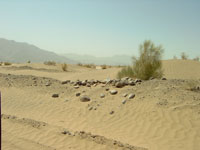 When we drove through the gate that leads from Iran to Pakistan, the perfect Iranian tarmac suddenly ended and we found ourselves on a sandy road. Very promising.
When we drove through the gate that leads from Iran to Pakistan, the perfect Iranian tarmac suddenly ended and we found ourselves on a sandy road. Very promising.
We had to wait for the customs officer on duty and spent this time watching the other border policemen smoking a fat joint on the veranda next to the police office...
The rest of the terrain was full of those famous Pakistani trucks, one more beautifully done up than the other, it looked like a circus terrain rather than a truck parking.
After three hours we could finally leave the border and start off on the long and lonely road through the endless sand desert that is West-Pakistan. The 600 km road to Quetta is running less than 100 km south of the Afghan border and the area (Baluchistan) is infamous for drugs smuggling, smuggling of humans, banditry and tribal feuds. And here, 100 km east of the border in the middle of freaking nowhere, the battery lamp started burning. Apart from some camels there was nobody wide and far, so we decided to take the risk and ignore the battery lamp. This is not the right place to spend the night.
The sand storm we had yesterday in Iran had also raged here and every now and then there were sand dunes on the road. Men in long dresses were busy shovelling them aside to clear the road. It is hot as an oven here, we even saw fata morgana's and sand dunes "floating" on the shimmering air.
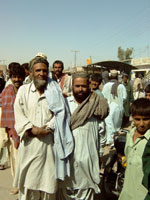 We stayed a day in the fantastic state rest house of the small village Dalbandin to find out what made the battery lamp burn and walked a bit through the village centre. That day, some 7000 Muslims from Afghanistan, Iran and Pakistan had gathered to pray for peace in the world, so the village was full of bizarre looking men (I was the only woman on the street) from the many tribes that live in this area. All of them dressed in their traditional tribal clothes, some looked like the ancient Asterix-Druids, others had bright turbans or silver embroidered little hats. If we thought they were the paradise birds, we were wrong. Within 5 minutes after we had ventured out onto the street, we were surrounded by some 50 men, who all wanted to know everything about us. When we walked on, half the village followed us.
We stayed a day in the fantastic state rest house of the small village Dalbandin to find out what made the battery lamp burn and walked a bit through the village centre. That day, some 7000 Muslims from Afghanistan, Iran and Pakistan had gathered to pray for peace in the world, so the village was full of bizarre looking men (I was the only woman on the street) from the many tribes that live in this area. All of them dressed in their traditional tribal clothes, some looked like the ancient Asterix-Druids, others had bright turbans or silver embroidered little hats. If we thought they were the paradise birds, we were wrong. Within 5 minutes after we had ventured out onto the street, we were surrounded by some 50 men, who all wanted to know everything about us. When we walked on, half the village followed us.
The further we drove east from Dalbandin, the narrower and more pot-holed the road became. After some 100 km all that was left was a 2,5 m broad, bumpy trail of tarmac. This means that in case of oncoming trucks you really have to bite the dust in the desert on each side of the trail. That, combined with the left hand driving they have in this former British colony, makes for some pretty tiring driving. The people in the little villages we passed smiled and waved, although small boys often begged for "one pen" and sometimes threw a stone at the car. When we stopped for a tea at a stall at the roadside, some 20 men gathered around us and stared at us. Nobody spoke to us, everyone just stood there and stared until we left after finishing our tea. It makes you feel a bit giggly.
We didn't manage to get to Quetta before dusk and had to face the chaos in the city in the dark. The narrow streets were packed with pedestrians, cyclists, rickshaws, men pushing hand carts full of merchandise, donkey- and horse carts, small cars and buses with at least twice as many passengers as they are allowed to carry. And everyone just went in every possible direction, there don't seem to be any rules. The air was thick with smog; there was a bluish fog hanging in the streets that hurt the eyes, nose and throat. Hardly anyone uses lights over here, if people are afraid they won't be seen they use their horn or their dippers. That saves the battery. We managed to get to the hotel in the centre of the city and still only hit one biker. He just scrambled to his feet again, stepped back on his bike and drove away as if nothing had happened.
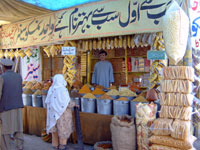 For two days we just strolled through Quetta. A city without "sights" in the classical sense, but with an amazing lot to see! Tribal people in the most fantastic traditional clothes were swarming over the narrow streets, beggars - one of them no more than a trunk with a head on it - tugged at our sleeve for a few rupees, bazaar shops were stuffed with brightly coloured cloth with gold embroidery, little mirrors and beads or with any weapon you fancy. Every now and then we saw wild looking men with long beards carrying machine guns, but we seemed to be the only ones to be surprised. Many people addressed us and thanked us for not believing the negative propaganda about their country in the western media and for coming to Pakistan anyway. Cute.
For two days we just strolled through Quetta. A city without "sights" in the classical sense, but with an amazing lot to see! Tribal people in the most fantastic traditional clothes were swarming over the narrow streets, beggars - one of them no more than a trunk with a head on it - tugged at our sleeve for a few rupees, bazaar shops were stuffed with brightly coloured cloth with gold embroidery, little mirrors and beads or with any weapon you fancy. Every now and then we saw wild looking men with long beards carrying machine guns, but we seemed to be the only ones to be surprised. Many people addressed us and thanked us for not believing the negative propaganda about their country in the western media and for coming to Pakistan anyway. Cute.
In the hotel we met two Dutch guys, a Belgian and a German, who came here on their motorbikes. With Bart, the guy from Antwerp, we went to search for beer. Alcohol is actually forbidden here and as a tourist you have to get a special permit, but we hoped to get some beer without that too. After some searching we found the "liquor store" that was "closed"; the shutters were pulled down to some centimetres above the floor and in front of it a guy was set to watch. Some invisible hand inside rolled the beer bottles through the slit, the guy outside quickly stashed it away in a brown paper bag and we were sent away immediately, before we could attract any attention.
After a last piece of delicious Black forest cherry cake (!) at the "Dolphin bakery" we left Quetta and headed south. We passed the Bolan-pass that runs through a rough but very dry and brown mountain range, and admired the ingenious train tunnels and bridges and the castles above it that were built to guard them. South of the pass the landscape became greener and greener; we passed rice fields, palm trees, black buffalos sitting in the water and overcrowded and dusty villages. Everywhere we saw unusual animals like parrots, white herons, storks, pelicans and birds of prey. We even saw a little alligator cross the road in front of us!
We stayed the night in Sibi, according to the travel guide the hottest place on the Indian subcontinent and indeed uncomfortably hot at 40°C. The chicken curry we ate in Quetta was giving me problems and I spent the entire night on the toilet. Great!
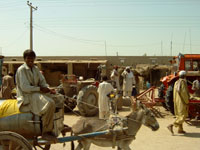 Still further south we went, over a horrible road to Sukkur. From one of the many checkpoints on the road a police pickup emerged and kept driving in front of us. In the back 4 police officers were watching us, holding their Kalashnikovs. Every so many km they were replaced by a new pickup with fresh officers; this must be the police escort other travellers have told us about. In Sukkur we were brought to the state rest house and the police insisted on our taking a room there, for free. The rooms were in English colonial style, with wooden wall panels and air conditioning! An offer we could not refuse when the temperature in the van was over 40°C! The police left two guards, who patrolled around the camper the entire night and guarded our room.
Still further south we went, over a horrible road to Sukkur. From one of the many checkpoints on the road a police pickup emerged and kept driving in front of us. In the back 4 police officers were watching us, holding their Kalashnikovs. Every so many km they were replaced by a new pickup with fresh officers; this must be the police escort other travellers have told us about. In Sukkur we were brought to the state rest house and the police insisted on our taking a room there, for free. The rooms were in English colonial style, with wooden wall panels and air conditioning! An offer we could not refuse when the temperature in the van was over 40°C! The police left two guards, who patrolled around the camper the entire night and guarded our room.
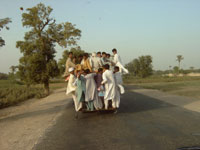 At 7:30 am the next day there was a knock on the door: "your escort is waiting". The police were in a great hurry to get us out of their administrative area and raced away. There was no time for breakfast, not even time to buy some water. For four hours we tried to keep up with them while they roared over the pot-holed roads with wailing sirens, through overcrowded villages where chicken, children and grannies could scramble aside only just in time before our convoy. The escort had been doubled by now: before us still the patrol car with the armed police officers, but behind us a new pickup had been added, carrying a machine gun on a tripod and a guy with helmet who operated it. After four hours without food and drink we were really fed up and stopped at a tea stall to at least get something to drink. The police were looking annoyed; after all the next escort was waiting a few miles down the road, but we really needed that drink. The Quetta-curry was still bothering me, so within an hour I had spit out my Sprite-breakfast again.
At 7:30 am the next day there was a knock on the door: "your escort is waiting". The police were in a great hurry to get us out of their administrative area and raced away. There was no time for breakfast, not even time to buy some water. For four hours we tried to keep up with them while they roared over the pot-holed roads with wailing sirens, through overcrowded villages where chicken, children and grannies could scramble aside only just in time before our convoy. The escort had been doubled by now: before us still the patrol car with the armed police officers, but behind us a new pickup had been added, carrying a machine gun on a tripod and a guy with helmet who operated it. After four hours without food and drink we were really fed up and stopped at a tea stall to at least get something to drink. The police were looking annoyed; after all the next escort was waiting a few miles down the road, but we really needed that drink. The Quetta-curry was still bothering me, so within an hour I had spit out my Sprite-breakfast again.
In Bahawalpur we stopped at the state rest house (PTDC) and spent two days resting and getting better. From here there is no more police escort, happily!
Still not entirely healthy we decide to relax for another two days in the nature reserve near Bahawalpur. We found a beautiful spot on a "British" lawn where we did nothing and tried not to get annoyed by the staring locals. A school class of some 20 teenage boys who first stared at me open-mouthed for a full 15 minutes and then started to make pictures from about 1 metre distance without asking my permission did get a little on my nerves though. A woman in public and a blond one too, it shouldn't be allowed!
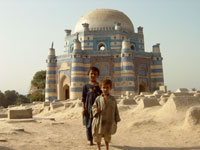 Via the beautifully tiled mausoleums of Uch Sharif we drove to Multan. Although it was only 100 km away, we still didn't make it before dark. And driving in the dark is really terrible here; the locals drive just as deadly as during the day. The only difference is that nobody really sees anything because half of the vehicles drive without headlights and the other half drive with full beam. In Multan we were rammed by a rickshaw, both had some damage, both drove without insurance so both drove on as quickly as possible, hoping the other would not start screaming.
Via the beautifully tiled mausoleums of Uch Sharif we drove to Multan. Although it was only 100 km away, we still didn't make it before dark. And driving in the dark is really terrible here; the locals drive just as deadly as during the day. The only difference is that nobody really sees anything because half of the vehicles drive without headlights and the other half drive with full beam. In Multan we were rammed by a rickshaw, both had some damage, both drove without insurance so both drove on as quickly as possible, hoping the other would not start screaming.
While walking back to the hotel after dinner we were stopped by a taxi whose driver insisted on dropping us at the hotel for free. Instead of stopping at the hotel, however, they drove on because they wanted to take us "somewhere". I swung the door wide open, thus forcing him to stop the car before he lost his door on a lantern pole and we were out of the car before he realized what happened. He followed us back to the hotel though, and started to scream at the hotel owner who wanted to send him away. Up to about 30 men gathered and everyone started to shout and wave with his arms. In the end the creep slinked away, thank God!
 We actually wanted to visit the medieval markets of Multan, but that day was the first Friday (the "Sunday" of Islam) since an important religious leader was killed in Islamabad and the hotel owner in Multan told us there had been some riots in Multan since. Best to leave this place as soon as possible, the markets are closed on Fridays anyway. When we left the city we saw teargas installations and army tanks at the roadsides. Afterwards, we hear that Multan had indeed become a mess after the Friday prayer, so it had been a good decision to leave.
We actually wanted to visit the medieval markets of Multan, but that day was the first Friday (the "Sunday" of Islam) since an important religious leader was killed in Islamabad and the hotel owner in Multan told us there had been some riots in Multan since. Best to leave this place as soon as possible, the markets are closed on Fridays anyway. When we left the city we saw teargas installations and army tanks at the roadsides. Afterwards, we hear that Multan had indeed become a mess after the Friday prayer, so it had been a good decision to leave.
 Lahore was the biggest traffic chaos so far; forget Athens or Tabriz, this beats them all (although I will come back on these words later, in India...). All kinds of vehicles were swarming over the roads, the most bizarre sounding horns were being used non-stop (it sounds a bit like elephant trumpeting, but then at about twice as many decibels as the maximum allowed in the EU), people bumped into each other and just drove on, a guy on a scooter ran over an old man on a bike, pedestrians jumped in front of our car with total contempt for death and rickshaws came shooting out of the most unexpected corners.
Lahore was the biggest traffic chaos so far; forget Athens or Tabriz, this beats them all (although I will come back on these words later, in India...). All kinds of vehicles were swarming over the roads, the most bizarre sounding horns were being used non-stop (it sounds a bit like elephant trumpeting, but then at about twice as many decibels as the maximum allowed in the EU), people bumped into each other and just drove on, a guy on a scooter ran over an old man on a bike, pedestrians jumped in front of our car with total contempt for death and rickshaws came shooting out of the most unexpected corners.
We strolled around Lahore for two days and I really tried my best to ignore the staring, the animal sounds, the moaning and the "oh baby" or "yeah"-remarks of the more than frustrated Pakistani men. Incredible, since I am wearing my head scarf and the potato bag-jacket that I bought in Iran.
The old centre of Lahore would be the ideal setting for a film about the Middle Ages with its narrow old bazaar lanes full of tiny shops. There was rubbish everywhere, from plastic to rotting fruit and offal. The stench was overwhelming. In front of many shops we saw crates with live chicken, at the sides goats and sheep were waiting to be slaughtered. The wooden slaughter blocks were by the sight of them at least 50 years in service and the meat was crawling with hundreds of flies. The women (yes, there are women in the street of Lahore, even without head scarves!) looked beautifully in their brightly coloured "shalwar qamiz" suits. They looked very Indian.
 Before leaving Pakistan we wanted to visit the Swat-valley in the North of Pakistan. The road from Lahore to Islamabad made us feel we were back in Germany: it is a brand new 6 lane highway, featuring shiny new motels and restaurants. We spent the night in Taxila, a little village west of Islamabad. At night we were woken up by a lot of whining from under the car and found two puppies that looked as if they were less than a month old. The poor little things were nearly starved, their ribs very visible, the smallest even with a Biafra-belly from hunger oedema. We decided we could not let them die and took them with us. They hardly reacted to anything anymore, so we took them to a vet who gave them some antibiotics. Umar, a nice man who had visited Holland once, invited us to take our dogs to his house and clean them there. The rest of the afternoon was spent cleaning dogs and taking out ticks (about 40 per dog!). Umar also invited us for dinner and to a music session with his band in an unused Hindi-temple. It was great fun, Coen has sung for the audience of some 30 men that had gathered to watch.
Before leaving Pakistan we wanted to visit the Swat-valley in the North of Pakistan. The road from Lahore to Islamabad made us feel we were back in Germany: it is a brand new 6 lane highway, featuring shiny new motels and restaurants. We spent the night in Taxila, a little village west of Islamabad. At night we were woken up by a lot of whining from under the car and found two puppies that looked as if they were less than a month old. The poor little things were nearly starved, their ribs very visible, the smallest even with a Biafra-belly from hunger oedema. We decided we could not let them die and took them with us. They hardly reacted to anything anymore, so we took them to a vet who gave them some antibiotics. Umar, a nice man who had visited Holland once, invited us to take our dogs to his house and clean them there. The rest of the afternoon was spent cleaning dogs and taking out ticks (about 40 per dog!). Umar also invited us for dinner and to a music session with his band in an unused Hindi-temple. It was great fun, Coen has sung for the audience of some 30 men that had gathered to watch.
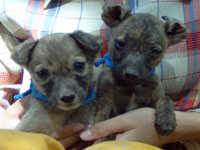 Since the dogs needed some time to get better, we dropped the Swat valley and drove to the tourist camp site in Islamabad instead. A real camping site, we felt as if we were back in Europe. We spent 12 days with the other overlanders Erwin and Bastienne from Holland, Walther from Germany and Bart from Belgium (whom we had met in Quetta before). The puppies - we named them Shimal (Pakistani word for "North" for the most quiet of the two) and Junub ("South") - were getting better every day and we had a relaxing time. The days just flew by with socializing, drinking coffee, working on the car and the website, searching for diesel injectors for the car and vaccinations for the dogs.
Since the dogs needed some time to get better, we dropped the Swat valley and drove to the tourist camp site in Islamabad instead. A real camping site, we felt as if we were back in Europe. We spent 12 days with the other overlanders Erwin and Bastienne from Holland, Walther from Germany and Bart from Belgium (whom we had met in Quetta before). The puppies - we named them Shimal (Pakistani word for "North" for the most quiet of the two) and Junub ("South") - were getting better every day and we had a relaxing time. The days just flew by with socializing, drinking coffee, working on the car and the website, searching for diesel injectors for the car and vaccinations for the dogs.
On one of his searching expeditions, Coen had a small accident with a guy who wanted to overtake where he couldn't and had to spend 5 hours at the police office. "Witnesses" that suddenly appeared out of nowhere were claiming the accident had been Coen's fault and the guy wanted USD 120 for damage. They probably thought they could squeeze a nice amount of money out of this tourist. After five hours of haggling (the police even "showed" a prisoner, complete with rattling chains) Coen paid USD 60 to get away there.
We found a "German" butcher that sold a kilo of mega fresh T-bone steaks for EUR 0,90 and gorged on grilled T-bones for days on end.
Islamabad was built in 1961 and looks like it: it is one big suburbia, made of concrete and a little run down, without a real centre.
The vet told us we had to get an export permit for the dogs at the Quarantine Officer of the Ministry of Agriculture and Live stock before we could leave Pakistan. Since he used to be the Quarantine Officer's teacher, he would put in a good word for us to make things easier. The good word helped: an assistant glanced at the dogs for half a second and two hours later we could pick up two export permits claiming the dogs had been in quarantine for 24 hours and that their blood had been tested on parasites.
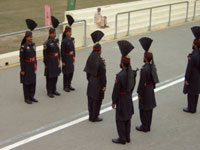 The only border post between India and Pakistan is at Wagha, near Lahore in Pakistan and Amritsar in India. We arrive there just in time for the sunset ceremony: the lowering of the flags and the closing of the border. A ridiculous performance!
The only border post between India and Pakistan is at Wagha, near Lahore in Pakistan and Amritsar in India. We arrive there just in time for the sunset ceremony: the lowering of the flags and the closing of the border. A ridiculous performance!
In funny looking uniforms with huge cocks combs on the helmets the border guards paraded around, using the most ridiculous steps; now they nearly hit their foreheads with the tip of their shoes, now they hop around like ballet dancers and shout at each other to show that their country is a lot better than that of the other. At both sides big amphitheatres have been built, each of them filled with a big audience egging on the soldiers with "Long live Pakistan / India" (The official language of Pakistan, Urdu, is quite similar to the official Indian language Hindi, so there is no problem understanding each other), on the Pakistani side "Allah akhbar" was added of course. Huge flags were waved at each other and everyone seemed to take this thing really serious. There was a little competition about who could roll down the rope from the flag pole first (Pakistan) and then the flags were being lowered very slowly, because none of the two countries would want their flag to be below that of the other.
It all seemed a lot of bad propaganda to me.
Dorrit
Part 2: 2004 (08.04.04 - 14.05.04)
Written by: Dorrit
 We quickly drove through India - allowing a pit stop in Delhi to visit our friends Panca and Seth - and arrived in Lahore at 8 April. There we visited the Mughal fort we had skipped on our way to India. It turns out to be okay but not really anything special, we should have opted for the Red fort in Delhi. That was built by the same family and seemed a lot more impressive and better preserved than Lahore's fort. Also, the crowd of followers would not have been so big there... Pakistan's men are still as much a nuisance as they were half a year ago!
We quickly drove through India - allowing a pit stop in Delhi to visit our friends Panca and Seth - and arrived in Lahore at 8 April. There we visited the Mughal fort we had skipped on our way to India. It turns out to be okay but not really anything special, we should have opted for the Red fort in Delhi. That was built by the same family and seemed a lot more impressive and better preserved than Lahore's fort. Also, the crowd of followers would not have been so big there... Pakistan's men are still as much a nuisance as they were half a year ago!
Since it was hot like an oven in Lahore we rushed on to Islamabad, which lies at a higher altitude. At the camping site we stayed a couple of days to do some work on the car and prepare it for the Karakorum Highway, the "highest motorable road in the world". We replaced brakes and shock absorbers and applied for our Iranian visa, that we could pick up two weeks later. In these two weeks we wanted to drive the Karakorum Highway (KKH) all the way up to the Chinese border and back.
The first three days to Gilgit (about half way up the KKH) we drove most of the time. Forests and green hills with grain terraces make up most of the first 100 km, then the Indus river - and the KKH - turn into an impressive, but very barren gorge towards the western Himalayans. The mountains are either brown or black, the river is about the greenest you get to see here. A real moonscape. Everything is dry, barren and deserted. No villages, no bushes, not even a bit of grass. All we saw every now and then was a goat ... and a Pakistani that was holding up 3 fishes at the road side in the middle of freaking nowhere! God knows how long he has stood here with his fish. Unbelievable.
Parts of the KKH have been blown out of the rocks with dynamite; here the road sits between a steep abyss to the left and a nearly vertical wall of rock and grit to the right. The wall to the right turns out to be more dangerous than the abyss to the left: at various places big rocks have come down and are lying on the road. At other places the tarmac is completely gone where the landslides have only just been removed from the road. Locals told us how a big rock fell on a passing car last week. The car was flat and the people in it dead. A scary story, we were twice as alert after hearing it.
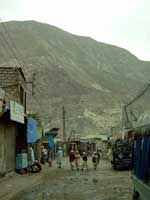 Gilgit is the most important town on the KKH - and the ugliest. An unsightly collection of concrete blocks, dirt streets and not a single bit of colour. There is not a woman to be seen in the streets, only men wearing beige shalwar qamiz (very comfortable, but extremely inelegant pyjamas). We intended to leave as soon as possible, but the rain kept us there for 3 more days. The KKH was blocked by landslides and rock fall made driving it during the rain too hazardous. Luckily we found a very good place to stay at the Mountain Refuge Hotel, where the owners received us most hospitably and cooked delicious traditional food for us every night. A tip for anyone who goes to Gilgit!
Gilgit is the most important town on the KKH - and the ugliest. An unsightly collection of concrete blocks, dirt streets and not a single bit of colour. There is not a woman to be seen in the streets, only men wearing beige shalwar qamiz (very comfortable, but extremely inelegant pyjamas). We intended to leave as soon as possible, but the rain kept us there for 3 more days. The KKH was blocked by landslides and rock fall made driving it during the rain too hazardous. Luckily we found a very good place to stay at the Mountain Refuge Hotel, where the owners received us most hospitably and cooked delicious traditional food for us every night. A tip for anyone who goes to Gilgit!
We killed time with walks along the river banks (between the rain showers) and with drinking tea. The walks however, were spoilt by boys who threw stones at the dogs or tried to kick them.
The dog, the pig and the rabbit are unclean animals according to Islam and are treated accordingly. I have asked several people in Pakistan and Iran what exactly is unclean about a dog that is not unclean about e.g. a cat, but unfortunately nobody knew an answer to that. Most of them just shrugged and said their parents and grandparents had told them so..
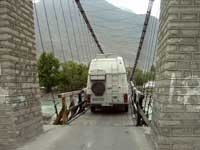 We left Gilgit via a 2m broad wooden suspension bridge, our camper van hardly fitted through. About 100 km north of Gilgit lies the Hunza valley, the most beautiful part of the KKH. A gorgeous green valley full of blossoming fruit trees and cute little villages perched in between the high and rough peaks of the Karakorum range. The people seem a lot friendlier and less strict: there are more women in the streets and they are less covered. Kids wave at us instead of throwing stones and adults smile and nod at us. The walls of the mosques bear slogans like "NO Taliban" instead of the "Proud to be Islamic fundamentalist" we saw in the village of Besham, 250 km south of here.
We left Gilgit via a 2m broad wooden suspension bridge, our camper van hardly fitted through. About 100 km north of Gilgit lies the Hunza valley, the most beautiful part of the KKH. A gorgeous green valley full of blossoming fruit trees and cute little villages perched in between the high and rough peaks of the Karakorum range. The people seem a lot friendlier and less strict: there are more women in the streets and they are less covered. Kids wave at us instead of throwing stones and adults smile and nod at us. The walls of the mosques bear slogans like "NO Taliban" instead of the "Proud to be Islamic fundamentalist" we saw in the village of Besham, 250 km south of here.
In Aliabad we spent a day at the fantastic PTDC-camping and had a lucky break: the clouds disappeared and uncovered a 360° view over the mountains around us. Everywhere we looked, white mountain slopes and icy walls were glittering in the sun. The camping offered a first class view over the mountains Rakaposhi (7788m) and Diran (+7500m), that towered over us impressively, nearly threatening. Sunset gave the fresh snow a magical yellow, then orange and finally red touch.
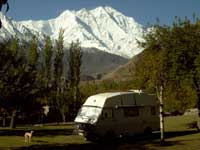 Upon leaving Aliabad we noticed that one of our suspension blades was broken, we will have to fix that later.
Upon leaving Aliabad we noticed that one of our suspension blades was broken, we will have to fix that later.
Our last stop along the KKH was Passu, since the final stretch to the Chinese border was still blocked by landslides. On our way there the road was blocked by a glacier that "walked" over the road. We did not even realize immediately what was going on; all of a sudden we were standing in front of a wall of ice. Below us, we saw how others were forcing their way through the river bed around the glacier and followed a local in a pickup-truck. The pickup was 4-wheel drive, we weren't. We got through all right, but not without breaking another suspension blade. These glacier views don't come cheaply!
In Passu we stayed at the Shisper View hotel, which offers a good view over the gigantic Passu glacier, a huge glittering ice valley of several kilometres length. The village people were all phoning each other hectically; government had extended the telephone cables to the village of Passu, so the people here had telephone access for the first time in their lives. Cute, how they were shouting "hello, helloooo" into the receiver and then waited for answer, their cheeks red from the excitement. As if you just went back some 80 years in time.
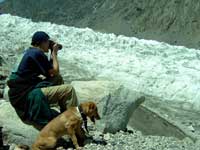 We walked along the glacier and got a heavy sunburn from the reflection of the sun on that big mass of ice. A closer look at the glacier revealed that it consisted of some hundreds of ice pyramids, that all creaked very loudly with each movement the glacier made. The outer ice pyramids were a brownish grey due to all the rock fall from the mountains around the glacier, but the inner ice pyramids were still of a wonderful bluish white.
We walked along the glacier and got a heavy sunburn from the reflection of the sun on that big mass of ice. A closer look at the glacier revealed that it consisted of some hundreds of ice pyramids, that all creaked very loudly with each movement the glacier made. The outer ice pyramids were a brownish grey due to all the rock fall from the mountains around the glacier, but the inner ice pyramids were still of a wonderful bluish white.
The following days we followed some hiking trails through the snow-covered mountain area and through the river bed with fruit orchards on each bank. When after a few days the weather turned bad again we quickly drove back to Gulmit, some 15 km south of Passu, where there are at least a few shops and restaurants in case we would be stuck again. In Gulmit we also found a mechanic who agreed to replace our suspension blades for EUR 30. It took him two days and made us the proud owner of two extremely strong suspension blades - taken out of a Pakistani tractor. It drives very well though, so if the German TÜV (car inspection) agrees we leave them in. We allowed ourselves a room in the local Silk Route Lodge (the third time during our trip we take a room) and spent two pleasant evenings with Monika from Switzerland and Elisabeth, a US American woman who does voluntary work in this area. Due to the rain it was too dangerous to do any hikes, we were a bit too early for the KKH, it was still the rainy season. But that also meant that the mountains were at their best on a clear day, thanks to the fresh snow.
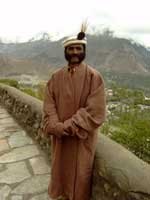 As soon as the weather allowed it we moved on to Aliabad, which we used as a base to explore the cute little village of Karimabad. We visited the rock inscriptions, ate some of the delicious apricot soup on a beautiful little terrace with a view over the whole valley and visited the picturesque 12th century Baltit fort. That turned out to be rather expensive and not half as interesting as the outside of the fort. We returned to Aliabad by local taxi/bus, a Suzuki-pickup with richly decorated Pakistani tent-top over the cargo compartment. 12 people were squeezed inside, 4 extra men were hanging from the back. The tailboard was turned down, two 20 kg bags of wheat were lying on it. To prevent the bags from falling down, a fifth man was squatting on top of them, nearly falling off at each turn we made. The pickup was overloaded so badly that the chassis hit the ground at each bump in the road - of which there were many - and the hanging men had to get off at each hill and push the car in order to reach the top of the hill.
As soon as the weather allowed it we moved on to Aliabad, which we used as a base to explore the cute little village of Karimabad. We visited the rock inscriptions, ate some of the delicious apricot soup on a beautiful little terrace with a view over the whole valley and visited the picturesque 12th century Baltit fort. That turned out to be rather expensive and not half as interesting as the outside of the fort. We returned to Aliabad by local taxi/bus, a Suzuki-pickup with richly decorated Pakistani tent-top over the cargo compartment. 12 people were squeezed inside, 4 extra men were hanging from the back. The tailboard was turned down, two 20 kg bags of wheat were lying on it. To prevent the bags from falling down, a fifth man was squatting on top of them, nearly falling off at each turn we made. The pickup was overloaded so badly that the chassis hit the ground at each bump in the road - of which there were many - and the hanging men had to get off at each hill and push the car in order to reach the top of the hill.
Time was slowly running out, so we returned to Gilgit as soon as the landslides on the stretch Aliabad - Gilgit had been cleared. The road had obviously suffered badly during the last days and many times we could only drive at walking pace. In Gilgit we watched BBC World and saw how the EU celebrated its enlargement with 10 new member states. It all seemed very far away for us.
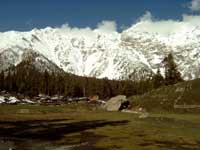 We allowed ourselves one last trip along the KKH, which turned out to be the best. At the Raikot bridge over the Indus river, about 80 km northeast of Chilas, we parked the van and took a jeep up into the mountains to "Fairy Meadows". The jeep ride was terrible but impressive, over a grit path as broad as the jeep that is partly built onto the mountain side, partly blown out of it. Here too, have been many landslides; we were told that we were sitting in the first jeep to go up here this year. Three times we had to stop and clear the road from that night's landslides before we could continue. Sometimes the path was crumbled away on the outer side, allowing so little space for the jeep that the outer wheels were only half on the path, half in the air. Even the dogs panicked and wanted to jump out. But the driver was very experienced and pulled the jeep through every time. We were bouncing up and down in the back of the jeep on the iron benches and were being treated on local music turned so loud, that the sound was deformed by the weak speakers built into the iron benches. This is exactly what I had expected of an Asia trip! The driver was accompanied by two men who searched the rock wall for falling stones, pushed when the jeep was stuck in the sandy parts of the road and cleared big rocks from the road. The road ends near the village of Tato, about half way to Fairy Meadows. The rest we would have to walk. We ate a little something in a stall between the locals, many of whom were wearing a Kalashnikov over their shoulder. One of the men told us this is a "autonomous" area where the Pakistani police has no business and where the locals take care of "law and order" themselves. Something they seem to be needing a machine gun for.
We allowed ourselves one last trip along the KKH, which turned out to be the best. At the Raikot bridge over the Indus river, about 80 km northeast of Chilas, we parked the van and took a jeep up into the mountains to "Fairy Meadows". The jeep ride was terrible but impressive, over a grit path as broad as the jeep that is partly built onto the mountain side, partly blown out of it. Here too, have been many landslides; we were told that we were sitting in the first jeep to go up here this year. Three times we had to stop and clear the road from that night's landslides before we could continue. Sometimes the path was crumbled away on the outer side, allowing so little space for the jeep that the outer wheels were only half on the path, half in the air. Even the dogs panicked and wanted to jump out. But the driver was very experienced and pulled the jeep through every time. We were bouncing up and down in the back of the jeep on the iron benches and were being treated on local music turned so loud, that the sound was deformed by the weak speakers built into the iron benches. This is exactly what I had expected of an Asia trip! The driver was accompanied by two men who searched the rock wall for falling stones, pushed when the jeep was stuck in the sandy parts of the road and cleared big rocks from the road. The road ends near the village of Tato, about half way to Fairy Meadows. The rest we would have to walk. We ate a little something in a stall between the locals, many of whom were wearing a Kalashnikov over their shoulder. One of the men told us this is a "autonomous" area where the Pakistani police has no business and where the locals take care of "law and order" themselves. Something they seem to be needing a machine gun for.
Who can picture our surprise therefore, when out of nowhere a tour group of Japanese pensioners appeared! Aren't these guys everywhere?!
We started our walk to Fairy Meadows, a tough climb of about 3 hours over goat trails along the mountain slope which is blocked by landslides twice. While we scrambled over them we could not help wondering how the Japanese pensioners would get to Fairy Meadows. Indeed, they did not dare to walk on very far. Their Pakistani tour leader however, just packed them on a horse and chased them over the goat trails. When they finally arrived upstairs they looked a bit sick and their voices were quavering somewhat, but like real Japanese they would rather die than admit they had been scared. I was actually quite impressed by them, there was even a 70-year old among them.
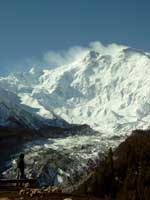 Fairy Meadows is a plateau at 3300m (we climbed 1800m today!) where it was extremely cold. We arrived in a snow storm that turned into a hail storm and retreated in the wooden hut that serves as a restaurant. Inside it was nearly as cold as outside and we froze a lot during the two days we stayed here. But what a beautiful place! The plateau is covered with sloping, grassy fields and dark pine forests and dotted with picturesque wooden huts with carved doors and roofs. The fields are used for horse training and grazing and are fenced off by wooden fences. Men and boys are hanging over them, idly talking the day away or looking at the horses. Like a ranch in the northern states of the US. The locals only live here in summer, in winter it is too cold up here and every autumn they move down to their houses in the Indus valley.
Fairy Meadows is a plateau at 3300m (we climbed 1800m today!) where it was extremely cold. We arrived in a snow storm that turned into a hail storm and retreated in the wooden hut that serves as a restaurant. Inside it was nearly as cold as outside and we froze a lot during the two days we stayed here. But what a beautiful place! The plateau is covered with sloping, grassy fields and dark pine forests and dotted with picturesque wooden huts with carved doors and roofs. The fields are used for horse training and grazing and are fenced off by wooden fences. Men and boys are hanging over them, idly talking the day away or looking at the horses. Like a ranch in the northern states of the US. The locals only live here in summer, in winter it is too cold up here and every autumn they move down to their houses in the Indus valley.
Only the next morning however, when the weather was clear we discovered the real beauty of Fairy Meadows: the plateau with its grassy fields and pine forests is lying in the middle of a huge amphitheatre of snow-covered mountains, which lie in a ring around it.
A prominent place is reserved for Nanga Parbat, 8126m high and dazzling white. It has the reputation of being the most difficult mountain in the world to climb and looks like it. It is Pakistan's second highest mountain after K2 (which in turn is the second highest mountain in the world) and the 8th highest in the world. The Pakistani call it "Killer Mountain" or "King of the Himalayans".
The Fairy Meadows plateau seems to be made to serve as a viewpoint for Nanga Parbat, it just has the ideal location, with Nanga Parbat sitting right in front of it. We were able to see every glittering ice peak and snowy valley on the mountain side to the last detail and had a splendid view over the glacier that came running down from the mountain into the deep and narrow gorge through which we climbed up here.
 We walked around over the plateau, passing idyllic forest lakes and grassy fields full of Edelweiss and age-old wooden huts, which half collapsing roofs are covered in a thick layer of grass and little yellow flowers. Unfortunately we had to seek cover from another snow storm and were happy to have brought our -10°C sleeping bags. Near the end of the day the weather cleared and we could enjoy a marvellous sunset that gave the snow on Nanga Parbat a beautiful orange and red hue.
We walked around over the plateau, passing idyllic forest lakes and grassy fields full of Edelweiss and age-old wooden huts, which half collapsing roofs are covered in a thick layer of grass and little yellow flowers. Unfortunately we had to seek cover from another snow storm and were happy to have brought our -10°C sleeping bags. Near the end of the day the weather cleared and we could enjoy a marvellous sunset that gave the snow on Nanga Parbat a beautiful orange and red hue.
It is most beautiful, however, at night when there is a full moon. Only then it becomes clear why this place is called Fairy Meadows and why the ice plateau on top of Nanga Parbat is called "Silver Plateau". This must be the most beautiful place in Pakistan!
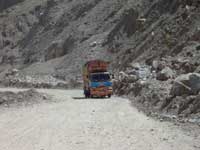 For the way down we could not afford a jeep ride, the hut turned out to be a lot more expensive than we thought (Rs 1200/nacht = EUR 9) and we barely had enough money with us. Walking down meant a 6 hour long, hot, dusty and steep descent (1800 m down over a distance of about 20 km), which gave us pain and blisters everywhere. We relaxed in Chilas, on the lovely English hotel lawn over a cup of milk tea. How colonial.
For the way down we could not afford a jeep ride, the hut turned out to be a lot more expensive than we thought (Rs 1200/nacht = EUR 9) and we barely had enough money with us. Walking down meant a 6 hour long, hot, dusty and steep descent (1800 m down over a distance of about 20 km), which gave us pain and blisters everywhere. We relaxed in Chilas, on the lovely English hotel lawn over a cup of milk tea. How colonial.
From Chilas it took us two full days to drive back to Islamabad. The further down we go, the busier and dirtier it got. The serene peace and quiet of the north was sorely missed.
In Islamabad we took a few days rest before the long drive to Iran, enjoyed the western stuff we could buy there, were astonished by the locals who just pull down their pants and squat down in the park whenever nature calls and finally we picked up our Iranian visa. For USD 55 each we got a 30 day tourist visa without any hassle.
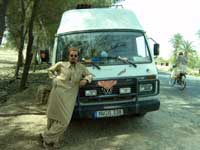 The drive to Iran was terrible: 5 long days we drove through Pakistan (we had to make that long detour via Sukkur again), from 4:30 am every morning and were being fried at a day temperature of 47°C and a minimum night temperature of 38°C. We hardly slept and were just happy that we were able to find safe hotel gardens to stay in at night, so that we could sleep outside and didn't have to venture inside our 50°C van. In honour of Mohammed's birthday (for three days...) night services were being held in the mosques. For hours and hours on end, the muezzins were singing how big Allah is and which prophets he has. In Bahawalpur machine gun fire in the street scared the hell out of us. Some 10 minutes later a police van appeared at the hotel parking and stayed there to guard us foreigners.
The drive to Iran was terrible: 5 long days we drove through Pakistan (we had to make that long detour via Sukkur again), from 4:30 am every morning and were being fried at a day temperature of 47°C and a minimum night temperature of 38°C. We hardly slept and were just happy that we were able to find safe hotel gardens to stay in at night, so that we could sleep outside and didn't have to venture inside our 50°C van. In honour of Mohammed's birthday (for three days...) night services were being held in the mosques. For hours and hours on end, the muezzins were singing how big Allah is and which prophets he has. In Bahawalpur machine gun fire in the street scared the hell out of us. Some 10 minutes later a police van appeared at the hotel parking and stayed there to guard us foreigners.
Along the route the usual cacophony of dirty little villages, wild looking bearded men wrapped in layers of cloth, burqa's (Afghan tents that completely cover a woman, with a piece of gauze in front of the eyes, in elegant pale blue or beige), chadors (black Iranian bed sheets that cover everything but the face - also for women of course), donkey- and oxen-carts, kids that have never had a wash in their lives and starving stray dogs. On the road lay a run-over crocodile.
In the desert of Sind, south of Sukkur, our battery alarm light with its fondness for volatile Pakistani areas lighted up again. The voltage regulator was broken (just like last time in Baluchistan), good thing we had asked my dad to bring a spare to Nepal. Coen fixed it in Sukkur, according to our travel guide one of the two hottest places on the Indian subcontinent.
From Quetta we were not allowed to drive on without police escort, this time a police officer with Kalashnikov was driving with us in our car. During the "change of guards" in one of the desert villages (recognizable by the barrels of illegal Iranian diesel on the road side) we noticed that we had a flat tyre. In the mid-day heat Coen changed the tyre, surrounded by some 20 spectators. We spent the night (is not equal to sleep) in the stiffling hot Dalbandin, so that we could arrive early at the Iranian border.
Dorrit
|
 |
|
 |
 |
 |
 |
Our top 5: |
 |
 |
1. Fairy Meadows
2. Passu
3. Aliabad
4. Karimabad
5. Lahore
|
 |
 |
 |
 |
 |
 |
 |
 |
TIP |
 |
 |
Visa: you can get a one month tourist visa for Pakistan for USD 30 in Ankara (Turkey) within two days
|
 |
 |
 |
 |
 |
 |
 |
 |
TIP |
 |
 |
In Quetta, there is a fantastic bakery named "Dolphin bakery" on Jinnah Road (left side), just north of the Habib Nala "river".
Here you find the best cakes, sandwiches and snacks.
|
 |
 |
 |
 |
 |
 |
 |
 |
TIP |
 |
 |
Exellent food can be had in Multan at "Tasty tikka", opposite the GTS bus stand on Sher Shah Road.
|
 |
 |
 |
 |
 |
 |
 |
 |
TIP |
 |
 |
The YWCA in Lahore is closed. Camping is possible (and good) at Faletti's hotel on Egerton Road.
|
 |
 |
 |
 |
 |
 |
 |
 |
TIP |
 |
 |
A very good diesel service for all types of cars can be found in Islamabad:
Diesel Tune-up-Service
Syed Habib-ur-Rehman
16/6-7, Street 23
G8/4, Islamabad
Tel:854474
|
 |
 |
 |
 |
 |
 |
 |
 |
TIP |
 |
 |
Places to stay along the KKH:
- PTDC, Besham
(Rs 100)
- Chilas Inn, Chilas
(Rs 100)
- Mountain Refuge,
Gilgit (Rs 50)
- PTDC, Gilgit
(Rs 150)
- PTDC Camping,
Aliabad (Rs 75)
- Shisper View, Passu
(Rs 50)
- Silk Route Lodge,
Gulmit (Rs 50)
|
 |
 |
 |
 |
 |
 |
|


